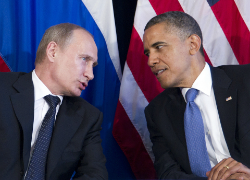
By the end of the summer, Russia will become the newest member of the World Trade Organization (WTO) after nearly twenty years of negotiations. This presents tremendous opportunities for American businesses, exporters, and innovators. Russia is the 7th largest economy in the world and trade between the United States and Russia is far from realizing its full potential. U.S. exports to Russia totaled almost $9 billion last year, and some studies indicate this could double within 5 years of Russia joining the WTO. Furthermore, when it does become a member, Russia will “be required—for the first time ever—to establish predictable tariff rates, ensure transparency in the publication and enactment of laws, and adhere to an enforceable mechanism for resolving disputes.” This means added protections for American agricultural exports and intellectual property rights. Ever hear of pirated DVDs you can buy for a dollar on the streets of Moscow? This will, sadly, become a thing of the past.
This all sounds too easy. And it is. First, both countries, in order to take advantage of the WTO agreement, must grant each other Permanent Normal Trade Relations (PNTR). Second, the U.S. Congress must lift trade restrictions contained in the 1974 Jackson-Vanik law. This targeted the former Soviet Union for blocking Jewish citizens from emigrating during the Cold War. Since this law prevents favorable trade relations with American businesses, the U.S. cannot grant Russia PNTR without also lifting Jackson-Vanik. In other words, unless the U.S. lifts Jackson-Vanik, the rules of the WTO will not apply between the two countries. If the rules of the WTO do not apply, American business will not benefit from the advantages that come with Russia’s WTO membership. IPR protections will not apply nor the lower tariff rates on U.S. products. And, to make matters worse, American business will have to sit and watch Chinese, Japanese, Canadian, and European businesses cash in on the freshly opened Russian market.
As if this could not become any more complicated, members of Congress are concerned that lifting Jackson-Vanik excuses Russia’s uninspiring human rights record. In Jackson-Vanik’s stead, many Congressmen on both sides of the aisle, including Senate top dogs John McCain and Joe Lieberman, support a new bill named after the late Russian lawyer, Sergei Magnitsky. Beaten to death while in prison, he was arrested after exposing massive tax fraud by officials within the Russia Interior Ministry. This bill would block individuals involved in human rights abuses in Russia from traveling to, studying in, or living in the United States. Congressmen want to make sure that if we grant PNTR to Russia (along with lifting Jackson-Vanik), we also communicate our disgust with how they treat their own citizens, their support of the Assad regime in Syria, and so on.
Recently, Secretary of State Hillary Clinton reassured us that granting PNTR is not a gift to Russia, as some may feel. Instead, “it is a smart, strategic investment in one of the fastest growing markets for U.S. goods and services. It’s also an investment in the more open and prosperous Russia that we want to see develop.” The Obama Administration, as well as Russian President Vladimir Putin, share this view.
The situation is compelling: creating jobs through international trade on the one hand versus supporting human rights on the other. Congress, of course, wants to have their cake and eat it too. After all, why can’t we, after engaging in some hard-nosed politics, bring both hands together? Perhaps, in 2012, engaging in trade with a fast-growing and modernizing Russia is the best option to foster human rights protections. Or perhaps, that is just a convenient excuse to put our wallets before our values.
Michael Cox is a rising 3L, a Candidacy Editor on the Denver Journal of International Law and Policy, and a Senior Staff Editor for The View From Above


